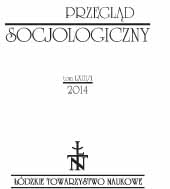Facing one another : Ethics of friendship in Town Twinning
Facing one another : Ethics of friendship in Town Twinning
Author(s): Andreas LangenohlSubject(s): Social Sciences
Published by: Łódzkie Towarzystwo Naukowe
Keywords: friendship; european integration; town twinning; ethics
Summary/Abstract: This article explores the significance of the concept of ‘friendship’ in town twinning in Europe from a praxeological perspective. In historiography and political theory, town twinning is usually associated with the political aim of instilling friendship between people of different municipalities in different countries, and thus between different nations. In contrast to these presuppositions, the present article reconstructs what friendship means in the framework of twinning practices on the basis of semi-structured qualitative interviews with twinning practitioners. The collected material challenges the commonly held belief that the political importance of twinning is in the presumed capacity of friendship to enable an understanding of the other. Research results show that at least for the first generation of twinning practictioners, twinning is primarily concerned with facilitating encounters prior to any linguistic and semantic communication or understanding. Contact with the other has been more important than understanding and communicating with the other. In other words, the concept of friendship as actualized in twinning has more in common with Georg Simmel’s notion of sociability (social intercourse for its own sake, based on assumed status equality and reciprocity) than with the modernist notion of friendship as an intimate relationship to another person to whom one exposes one’s innermost thoughts. This article concludes with some brief remarks on the historical contribution of town twinning, and its peculiar practice of trans-local friendships, to the grand projects of postwar restoration of peace in Europe, European integration since the 1970s, and to coping with the contemporary crises of the European Union, and thus of the European project.
Journal: Przegląd Socjologiczny
- Issue Year: 63/2014
- Issue No: 1
- Page Range: 27-47
- Page Count: 21
- Language: English

